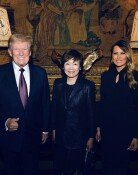China: Threat or Friend?
When driving my car, I frequently listen to Channel 4 or Channel 80. After watching Chinas grand opening ceremony last week, my wariness of China has gradually disappeared. Now, I think China is really great.
A former U.S. government officer in charge of Northeast Asian affairs gave this impression of the Beijing 2008 Olympic Games. NBC, which has the exclusive rights to Olympic broadcasts in the United States, delivers the latest news on the Beijing Games for Washington via Channel 4 and Channel 80.
The former officer said that a few days ago, he talked with colleagues on which Olympics can be compared to the Beijing Games, among those hosted by Berlin, Tokyo and Seoul.
Some compare the Beijing Games to the Berlin Olympics held under the leadership of Adolf Hitler in warning of the emergence of a "threatening dinosaur." Others say the Beijing Games are closer to the Tokyo Olympics, which showed Japans success story after World War II, and the Seoul Olympics, which provided growth momentum for Korea.
Paying keen attention to the Beijing Olympics, U.S. government experts have discussed how to consider the advent of a "super China" and what countermeasures to take.
▽ Two contrasting views
George Washington University professor Park Yoon-shik said China is apparently taking advantage of the Olympics as a chance to deliver a message of its "peaceful rise, but the majority of U.S. opinion leaders take a dim view of Chinas recent moves.
China emphasizes peace and cooperation since it is in need of cooperation from advanced Western nations. Many experts, however, wonder if China will keep that stance after securing a military force comparable to that of advanced Western nations.
A U.S. government official said, There are mixed views on China. Some experts believe the United States should keep closely cooperating with China, which will take a step forward in politics and human rights based on its economic growth. But some experts think the U.S. should urge China to change since China is highly likely to become an uncontrollable potential threat.
In an article, U.S. Treasury Secretary Henry Paulson said some in the United States believe China is a threat to be contained and driven back, but others think Chinas growth will provide an opportunity for the U.S. economy.
He said the only way leading to success for the United States is cooperation with China.
U.S. neoconservatives are discontent with pro-China policy of the Bush administration, warning China will pose the biggest threat to the United States given the Chinese political system.
▽ How to deal with China
Daniel Kilman, visiting scholar at the Center for Strategic and International Studies, suggested to Washington a "binding" strategy, saying that when Chinese dependence on the international system increases, it will learn to respect established rules.
Paulson also said Washington and Beijing have successfully held the U.S.-China Strategic Economic Dialogue since 2006, as political leaders and ministers of both countries have held frequent and deep conversations.
He said the only U.S. option is peaceful resolution of conflicts via close cooperation and bilateral and multilateral agreements, warning punitive legislation will deal a blow to the U.S. economy.
▽ How threatening is Chinas rise?
Jonathan Pollock of the U.S. Naval War College said the United States and China could face intensifying tension due to a bureaucratic process in which the two nations put focus on potential conflict while establishing defense plans, but this is not inevitable.
A diplomatic source said, U.S. concern over Chinas military strength has weakened since China has insufficient resources to mobilize its enormous army despite heavy investment in strengthening its military forces.
In an article, former British Foreign Secretary Malcolm Rifkind said that from a long-term perspective, Washington considers Beijing its strongest rival, but that China must wait for at least one generation to get "the gold medal."
Nevertheless, Washington is not lowering its guard. A senior diplomatic source said, The U.S. never uses the term ally when describing China.
sechepa@donga.com
Headline News
- Joint investigation headquarters asks Yoon to appear at the investigation office
- KDIC colonel: Cable ties and hoods to control NEC staff were prepared
- Results of real estate development diverged by accessibility to Gangnam
- New budget proposal reflecting Trump’s demand rejected
- Son Heung-min scores winning corner kick







